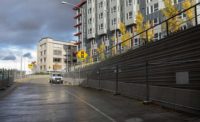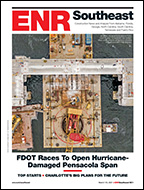

There will be no tunneling in 2014 of the new state Route 99 under downtown Seattle. The latest repair schedule, released on April 21, for North America’s largest tunnel-boring machine, dubbed Bertha, wasn’t what Washington State Dept. of Transportation officials hoped for. Sitting idle since December 2013, Bertha won’t dig again until late March 2015.
“Resuming tunneling will take longer than any of us would have liked, but making these repairs is a significant engineering challenge that must be done safely,” says Chris Dixon, project manager at Seattle Tunnel Partners, a joint venture of Dragados USA and Tutor Perini Corp.
What will amount to roughly a 16-month delay, from the original stoppage, pushes the project well beyond the expected completion date of late 2015, set by Seattle Tunnel Partners but within the WSDOT’s original expectation of November 2016.
The 57.5-ft-dia tunnel-boring machine will dig a 1.7-mile-long highway below Seattle, but plans stalled when the $80-million machine sputtered to a halt after traveling just 1,023 ft. After a futile two-month search for an obstruction outside Bertha, crews tried to push Bertha on Jan. 28, 2014. It went about four feet before overheating. Further investigation found broken bearing seals.
After originally stating there was no damage to the $5-million main bearing—made by German-based Rothe Erde as part of its contract with machine manufacturer Hitachi Zosen, Japan—the latest repair schedule indicates a repair crew will install the second main bearing, one of two manufactured. Other fixes scheduled for this year include a more robust seal system, new redundant systems and monitoring equipment.
Instead of dismantling the machine from the rear, Seattle Tunnel Partners decided to save time by drilling a 120-ft-deep, 80-ft-wide shaft in front of the cutter-head face, which is more than 50 ft below the surface.
That pit will start to take shape in late May. The work plan specifies excavation from late July through September. Dixon expects to remove the machine’s cutter head and begin repairing damage to the seal system and main bearing in October.
At that time, STP will make any other necessary changes to the machine.
Bertha should be ready for testing in February 2015 and resume tunneling in late March 2015, Dixon says.
The contractor should be able to make up four months of the 16-month delay, Dixon says, putting STP back on the original November 2016 time line and erasing all room for future error. According to the contract, STP will earn $100,000 per day, up to $25 million, for every day the tunnel opens before Nov. 1, 2016, but will face damages of $50,000 per day, up to $75 million, for every day after Nov. 1, 2016.
“We are disappointed by this delay, but we believe the new schedule is moving in the right direction,” says Todd Trepanier, WSDOT’s program administrator on the project.
Crews will continue $750 million worth of work at the tunnel portals and elsewhere along the corridor.




